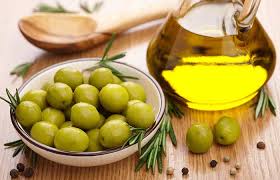Marta Guasch-Ferré, Ph.D., et al., analyzed 60,582 women and 31,801 men from the Nurses’ Health Study and the Health Professionals Follow-up Study who were free of cardiovascular disease and cancer at the study baseline in 1990. During 28 years of follow-up, the diet was assessed by a questionnaire every four years.
Olive oil consumption was calculated from the sum of three items in the questionnaire: olive oil used for salad dressings, olive oil added to food or bread, and olive oil used for baking and frying at home. One tablespoon was equivalent to 13.5 grams of olive oil. Olive oil consumption was categorized as follows: Never or <1 time per month; >0 to ≤4.5 grams/day (>0 to ≤1 teaspoon); >4.5 to ≤7 grams/day (>1 teaspoon to ≤1/2 tablespoon); and >7 grams/day (>1/2 tablespoon).
The consumption of other vegetable oils was calculated based on the participant’s reported oil brand and type of fat used for cooking at home. Margarine and butter consumption was based on the reported frequency of stick, tub, or soft margarine consumption, and the amount of margarine or butter added from baking and frying at home. Intakes of dairy and other fats and nutrients were also calculated.
The researchers found olive oil consumption increased from 1.6 grams/day in 1990 to about 4 grams/day in 2010, while margarine consumption decreased from about 12 grams/day in 1990 to about 4 grams/day in 2010. The intake of other fats remained stable.
Over the course of 28 years, there were 36,856 deaths with 22,768 occurring in the Nurses’ Health Study and 14,076 in the Health Professionals Follow-up Study. Participants with higher olive oil consumption were often more physically active, had Southern European or Mediterranean ancestry, were less likely to smoke, and had a greater consumption of fruits and vegetables compared to those with lower olive oil consumption. The average consumption of total olive oil in the highest category was about 9 grams/day at baseline and included 5% of the study participants.
When researchers compared those who rarely or never consumed olive oil, those in the highest consumption category had a 19% lower risk of cardiovascular mortality, 17% lower risk of cancer mortality, 29% lower risk of neurodegenerative mortality, and 18% lower risk of respiratory mortality. The study also found substituting 10 grams/day of other fats, such as margarine, butter, mayonnaise, and dairy fat, with olive oil was associated with an 8-34% lower risk of total and cause-specific mortality. They found no significant associations when substituting olive oil for other vegetable oils.
“Our findings support current dietary recommendations to increase the intake of olive oil and other unsaturated vegetable oils,” said Guasch-Ferré. “Clinicians should be counseling patients to replace certain fats, such as margarine and butter, with olive oil to improve their health.”
She adds that “It’s possible that higher olive oil consumption is a marker of an overall healthier diet and higher socioeconomic status. However, even after adjusting for these and other social-economic status factors, our results remained largely the same.”
In an accompanying editorial, Susanna C. Larsson, Ph.D., said, “The current study and previous studies have found that consumption of olive oil may have health benefits. However, several questions remain. Are the associations causal or spurious? Is olive oil consumption protective for certain cardiovascular diseases, such as stroke and atrial fibrillation, only or also for other major diseases and causes of death? What is the amount of olive oil required for a protective effect? More research is needed to address these questions.”




